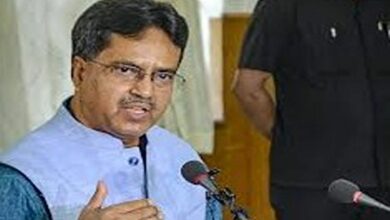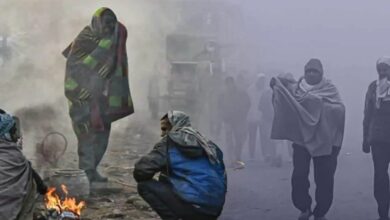MRM took a step to promote communal harmony and religious tolerance in Indian society
The Muslim Rashtriya Manch (MRM) has taken action to encourage religious tolerance and communal peace in Indian culture, stressing that disagreements over sacred places should ideally be settled amicably.

An official statement from the Muslim Rashtriya Manch states that the organization has urged Indian Muslims to show generosity in guiding India toward growth and to honor the statement made by RSS president Mohan Bhagwat for the wellbeing of 142 crore Indians.
The MRM’s National Convener and Media In-charge, Shahid Sayeed, stressed that while courts are important, disagreements over sacred sites should preferably be settled amicably.
According to him, this strategy eradicates animosity and promotes peace, unity, integrity, fraternity, and reconciliation. Any civilized community should strive for a “out-of-court settlement” whilst legal problems are still pending, according to the MRM.
In order to restore ancient places of worship for the Hindu community, the National Convener Council of the MRM declared that disagreements over locations such as Kashi, Mathura, and Sambhal should be settled amicably.
The MRM also suggested that mosques that are no longer used for prayers be turned over to the Muslim community for restoration and revitalization.
According to the MRM, idolatry is prohibited in Islam.
“In accordance with Islamic teachings, any mosque that has shattered idols or places that have historical, sociological, or direct proof of being temples is unfit for worship. Such prayers are not genuine. The MRM said, using references to the Quran and Hadith, that building mosques on property that has been forcefully occupied is against Islamic principles.
On January 4, a significant MRM program is planned in Lucknow. Prior to this, delegates from 70 sites in 20 states and 6 Union Territories participated in an online meeting to discuss the agenda. Several small and big Muslim groups, leaders, and intellectuals participated in the conference, which was chaired by the MRM.
The World Peace Council, Bharat First, Hindustan First Hindustani Best, Cow Service Committee, Environmental and Public Life Protection Institute, Jamiat Himayat-ul-Islam, Kashmiri Protection Organization, Kashmiri Sewa Sangh, Sufi Shah Malang Organization, Women Intellectuals Group, and Youth Education and Madrasa Institute were among the organizations represented. In accordance with Islamic principles, the national conveners, state conveners, and co-conveners of the MRM endorsed the resolutions and suggested transferring contested places of worship to the Hindu community.
Leading personalities including Dr. Shahid Akhtar, Padma Shri Anwar Khan, Girish Juyal, Virag Pachpor, Syed Raza Hussain Rizvi, Dr. Shalini Ali, and Abu Bakr Naqvi were among the 200 attendees of the meeting, which was chaired by National Convener Mohammed Afzal.
Mohammed Afzal, the national convener, stated: “We want to make society more harmonious. India must grow and remain together as a nation if it is to advance. This appeal promotes religious tolerance and community cohesion. Brotherhood is our slogan.
Speaking as well, Abu Bakr Naqvi said, “We want to respect one another’s faiths. This project represents Indian Muslims’ commitment to the advancement of their country. For the sake of the wellbeing of the country, we must strike a balance between social obligations and religious beliefs.
The MRM has presented a comprehensive strategy to further its goals of conserving India’s cultural legacy and advancing the authentic teachings of Islam. In order to benefit the Muslim community as well as the larger country, this program seeks to eliminate misunderstandings and improve understanding among members of Indian society.
The resuscitation of historical landmarks, artistic traditions, and literary legacy are the main areas of concentration for the MRM’s active efforts to preserve India’s civilization and culture. It is believed that these initiatives are essential to preserving Indian society’s variety and depth.
The following guidelines were discovered during the discussion of delicate topics:
It stated that Muslims should be urged to adhere to Islamic principles and abstain from praying at sites that are contested or constructed by demolishing other places of worship, and that disputed sites should be turned over to the Hindu community based on historical evidence, traditional and direct proofs, and excavation findings.
As demonstrated in the Ayodhya case, where the verdict was widely accepted, it stated that court decisions should be regarded as supreme if dialogue or negotiations with the government are unable to resolve the issue and that the government should be urged to restore disputed sites through constitutional measures.
The MRM aims to emphasize that Muslims and Hindus in India have similar ancestors, customs, and civilizations via the ‘Connect with Roots’ (Aao Jadon Se Judein) campaign.
By highlighting the fact that, despite religious differences, Indian soil binds us together with a common history and culture, this program fosters community peace and a shared cultural legacy. Our language, customs, clans, and forefathers are all still Indian.
While speaking at the Mahanubhav Ashram Shatakpurti Samaroh earlier this month, RSS Chief Mohan Bhagwat encouraged various sects to work and educate their adherents about their faith since religious misunderstandings result in atrocities worldwide.
“Misunderstandings of religion have led to tragedies worldwide. A culture that rightly understands the religion is essential. Religion should be taught correctly since it is highly essential. “Half knowledge of religion will lead to ‘Adharma’ if it is not properly understood,” the principal of the RSS said.
“‘Adharma’ is the result of improper and insufficient religious understanding. Misconceptions about religion have led to all of the persecution and crimes committed in the name of religion throughout history. For this reason, it is necessary for the sects to strive and explain their faith,” he said.
Even as he emphasized the significance of the Ram Temple in Ayodhya as a symbol of Hindu devotion, the RSS head earlier called for peace and harmony in the nation, emphasizing that contentious subjects should not be brought up to sow discord.





